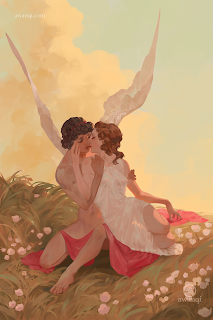Cupid and Psyche Vs. Iron Heinrich
Week 10/21/19- 10/27/19
Every
fairy tale and folk story have been contaminated and changed in some way, for
example The Greek myth of "Cupid and Psyche" and “Iron Heinrich” by
Jacob and Wilhelm Grimm. As a myth, the story of "Cupid and Psyche"
is meant to entertain and reaffirm the power of the gods in a way that is
perceived as a true event. "Iron Heinrich," however, is written not
as a truth, but to entertain and instill motifs found in some of their other
fairy tales.
The biggest
similarity between ‘Iron Heinrich’ by Jacob and Wilhelm Grimm and the story ‘Cupid
and Psyche’ by Lucius Apuleius is the beauty and the beast motif. Cupid and the
frog are the “beasts”. Psyche and the princess are their companions, the “beauty”.
We can determine this due to the representation of the beasts within the
princesses themselves. This is shown in "Cupid and Psyche" when
Psyche looks upon her husband for the first time, wielding a knife, prepared to
kill him if he turns out to be the gruesome monster her sisters foreboded.
Consequently, in "The Frog King," the princess shows her beastly side
as she angrily throws the frog against the wall, in hopes of killing him.
Another smaller similarity but still very present is the
first similarity is in the first paragraph of both tales. Both introductions
revolve around the youngest daughter who is beyond beautiful and adored by
all.
"In olden times, when wishing still did some
good, there lived a king whose daughters
were all beautiful, but the youngest was so beautiful that the sun itself, who,
indeed, has seen so much, marveled every time it shone upon her face." -
The Brothers Grimm (Ed 3)
"A certain king and queen had three daughters.
The charms of the two elders were more than common, but the beauty of the
youngest was so wonderful that the poverty of language is unable to express its
due praise. The fame of her beauty was so great that strangers from neighboring
countries came in crowds to enjoy the sight, and looked on her with amazement,
paying her that homage which is due only to Venus herself." - Lucius
Apuleius
 Both stories are very different, but these two biggest
similarities demonstrate the power of contaminating a tale. Both can
demonstrate and mean similar things but can be two completely different
stories.
Both stories are very different, but these two biggest
similarities demonstrate the power of contaminating a tale. Both can
demonstrate and mean similar things but can be two completely different
stories.



Comments
Post a Comment